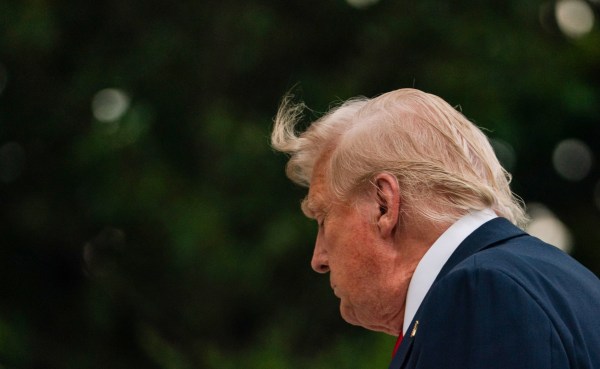Eight prominent conservatives released a report on Thursday examining “every claim of fraud and miscount put forward by former President Trump and his advocates” following the 2020 presidential election and reached an “unequivocal” conclusion: “Joe Biden was the choice of a majority of the Electors, who themselves were the choice of the majority of voters in their states.”
Former federal judge Thomas B. Griffith, who spearheaded the report’s creation and recruited other members of the group that produced it, told The Dispatch the report has been in the works for nearly a year and a half. Along with Griffith, the signatories include two other former federal judges (J. Michael Luttig and Michael W. McConnell), two former senators (John Danforth of Missouri and Gordon H. Smith of Oregon), former U.S. Solicitor General Theodore B. Olson, Republican election lawyer Benjamin Ginsburg, and David Hoppe, former chief of staff to Paul Ryan. Two of the signatories—Ginsburg and Luttig—have testified before the House committee investigating January 6.
Motivated in part by a “fundamental dissatisfaction with having to rely on others for the information,” Griffith recruited others of like mind to volunteer for a fact-finding mission.
“I just got on the phone and started calling fellow conservatives who I trusted,” Griffith said. “Let’s do a deep dive. Let’s—don’t rely on what others are telling us, let’s look at it ourselves. And, you know, if we come to the conclusion that there are serious problems with our election system, that it’s rife with fraud, then let’s be the advocates for getting that fixed, because that’s not sustainable. On the other hand, if we find out that those stories aren’t true … then let’s get out and tell folks that.”
Hoppe—who said he joined the effort about 10 months ago—told The Dispatch “the process started with saying, OK, if we’re going to analyze this, how do we do it? How do we make it manageable for a bunch of people who have daytime jobs, but want to do this and want to do this as effectively and thoroughly as possible?”
Hoppe said the group “had a lot of volunteer help—different people, different law firms, different lawyers with different backgrounds.” According to Griffith and Hoppe, at least some of those lawyers came from Griffith’s and Ginsburg’s firms. It was a volunteer effort, and no one was paid for their involvement, they said.
“We would discuss it as different pieces of it came together, different states came together,” Hoppe said. “We would sit down and discuss it, Zoom calls, telephone calls, and go through and ask questions. We would point out where there were weaknesses in the report, point out where we thought we might have found something to add another question. We wanted to pursue those sorts of things.”
In the executive summary, the authors provide a broad overview of the court cases in question. Less than half of the cases brought by Trump and his supporters—30 out of 64—included a hearing on the merits, and “[o]nly in one Pennsylvania case involving far too few votes to overturn the results did Trump and his supporters prevail.” Of the other 34 cases, “twenty were dismissed before a hearing on the merits, [and] fourteen were voluntarily dismissed by Trump and his supporters before a hearing on the merits.”
The report walks alphabetically through the six battleground states of Arizona, Georgia, Michigan, Nevada, Pennsylvania, and Wisconsin, providing both a written analysis and an addendum of court cases and their results for each state.
The section on Arizona also includes an addendum comparing the claims of the Cyber Ninjas’ post-election review with responses from Maricopa County. (Cyber Ninjas was a firm hired by the Republican-controlled Arizona Senate to investigate claims of election fraud, but the group presented no evidence of such fraud.)
One claim in Arizona was that ballot drop boxes were not fairly distributed throughout the state. The report notes that the plaintiffs in one lawsuit—who alleged that Arizona “unlawfully located more drop boxes in areas that tend to vote for progressive candidates than it did in traditionally conservative voting areas”—voluntarily dropped their suit. “We stress that the claims were voluntarily dismissed,” they write. “It is a disservice to the public for advocates of a candidate to continue to make claims of electoral improprieties when they have chosen not to test those claims in a court of evidence and law.”
In Georgia, Secretary of State Brad Raffensperger conducted a hand recount—and “the variance in total vote count between the machine and hand recounts was 0.1053%, far less than the 1.0 to 1.5% variance found in past Georgia elections.”
In Michigan, “Trump supporters made public claims that hundreds of thousands of absentee ballots were sent to voters without a prior request, in violation of Michigan law.” Instead, the state’s Republican-controlled Senate Oversight Committee found that many of the people making these claims had “actually received an absentee-ballot application, which is called for under Michigan law.”
In Pennsylvania, “the Associated Press identified just 26 potential cases of voter fraud, but these represent just 0.03% of Biden’s margin of victory, far, far too few to have any impact on the result.”
The list goes on. While the report goes deep in the legal weeds—it runs to 69 pages and includes 280 footnotes, one of which references a Dispatch fact check—Griffith said it was drafted to be “digestible and easily understood,” with a particular audience in mind: conservatives.
“The idea is that it’s written by conservatives, for conservatives,” Griffith said. “We recognize the people who are watching [Morning Joe and CNN] are probably not the people we’re primarily interested in. I mean, we’re happy to tell our message to anyone, but it’s really the folks who are conservatives who think the election was stolen.”
In the report’s executive summary, the eight men take pains to emphasize their conservative bona fides. “Every member of this informal group has worked in Republican politics, been appointed to office by Republicans, or is otherwise associated with the Party,” they write. “None have shifted loyalties to the Democratic Party, and none bear any ill will toward Trump and especially not toward his sincere supporters.”
Griffith and Hoppe acknowledge that what they are saying is not new. They are simply confirming what Trump’s own Department of Homeland Security, Department of Justice, and FBI said in the weeks following the election. And their report is narrowly focused on the question of whether the 2020 election was lost or stolen. Although Hoppe said his personal view as a non-lawyer is that reforms to the Electoral Count Act of 1887 “[deserve] to be looked at,” the group as a whole has not taken a position on election law reform.
There have been points in American history where widespread election fraud was a huge problem. As recently as 1960, there were credible allegations of widespread voter fraud in Illinois and Texas—allegations the losing candidate, Richard Nixon, chose not to pursue, telling a friend that “our country cannot afford the agony of a constitutional crisis.”
Griffith believes that today, election security is much better.
“I was really surprised to learn that over the past 20 years or so—actually primarily since Bush v. Gore—that there has been a real professionalization of election administration,” Griffith said. He praised the seriousness with which election officials in the country—from both parties—do their jobs. “It isn’t perfect, and we can get better, but it’s pretty darn good, and as a conservative, you know, my sensibilities, my temperament, is always that we preserve institutions. That’s what we do, right? We preserve the good, and this is something that’s really good. We ought to be preserving it instead of taking a sledgehammer to it with these accusations that it’s filled with corruption, because it’s just not—that’s just demonstrably false.”






Please note that we at The Dispatch hold ourselves, our work, and our commenters to a higher standard than other places on the internet. We welcome comments that foster genuine debate or discussion—including comments critical of us or our work—but responses that include ad hominem attacks on fellow Dispatch members or are intended to stoke fear and anger may be moderated.
With your membership, you only have the ability to comment on The Morning Dispatch articles. Consider upgrading to join the conversation everywhere.